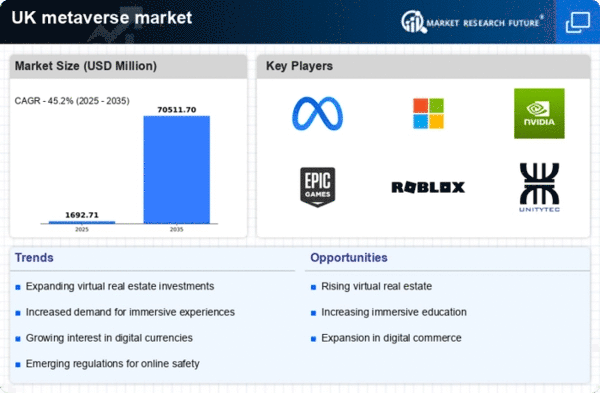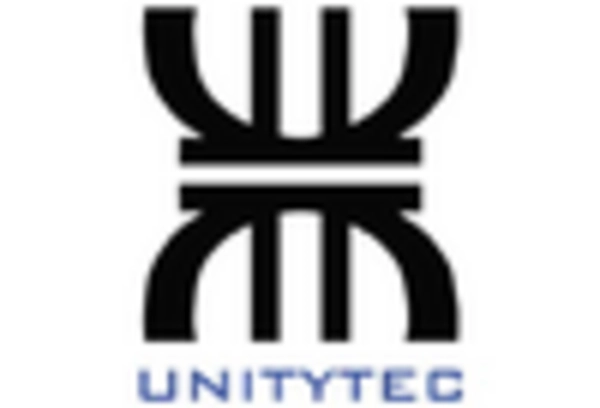Technological Advancements in VR and AR
The metaverse market in the UK is experiencing a surge due to rapid technological advancements in virtual reality (VR) and augmented reality (AR). Innovations in hardware, such as more affordable and powerful VR headsets, are making immersive experiences more accessible to consumers. According to recent data, the UK VR market is projected to grow at a CAGR of 30% from 2025 to 2030. This growth is likely to enhance user engagement within the metaverse market, as individuals seek more interactive and realistic environments. Furthermore, improvements in AR applications are facilitating the integration of digital elements into the physical world, thereby expanding the potential use cases within the metaverse market. As technology continues to evolve, it appears that the demand for immersive experiences will drive further investment and development in this sector.
Expansion of Gaming and Entertainment Sectors
The gaming and entertainment sectors in the UK are pivotal drivers of the metaverse market. With the gaming industry projected to reach £7 billion by 2026, the integration of metaverse elements into gaming experiences is becoming increasingly prevalent. Major gaming companies are investing in creating expansive virtual worlds that allow players to interact, socialize, and participate in various activities. This trend not only enhances user engagement but also attracts a broader audience to the metaverse market. Furthermore, the rise of esports and virtual concerts is likely to contribute to the growth of this market, as these events draw significant viewership and participation. As the boundaries between gaming and social interaction blur, the metaverse market is poised for substantial expansion, driven by the evolving landscape of entertainment.
Corporate Adoption of Virtual Collaboration Tools
The metaverse market is witnessing a notable increase in corporate adoption of virtual collaboration tools. As businesses in the UK seek to enhance remote work capabilities, many are turning to metaverse solutions for team collaboration and communication. A report indicates that 45% of UK companies are exploring virtual environments for meetings and training sessions. This shift is likely to foster a more interactive and engaging work culture, as employees can collaborate in immersive settings. The metaverse market stands to benefit from this trend, as companies invest in platforms that facilitate virtual teamwork and innovation. Moreover, the potential for cost savings associated with reduced travel and physical office space may further incentivize corporate investment in metaverse technologies, thereby driving growth in this sector.
Increased Consumer Demand for Digital Experiences
Consumer preferences in the UK are shifting towards digital experiences, significantly impacting the metaverse market. A recent survey indicates that over 60% of UK consumers express interest in engaging with brands through virtual environments. This growing demand is prompting businesses to explore innovative ways to connect with their audiences, such as hosting virtual events and creating branded virtual spaces. The metaverse market is likely to benefit from this trend, as companies invest in creating engaging digital experiences that resonate with consumers. Additionally, the rise of remote work and digital socialization has led to an increased appetite for virtual interactions, further propelling the growth of the metaverse market. As consumer expectations evolve, businesses may need to adapt their strategies to remain competitive in this dynamic landscape.
Regulatory Developments and Data Privacy Concerns
Regulatory developments and data privacy concerns are increasingly influencing the metaverse market in the UK. As the market expands, there is a growing emphasis on establishing guidelines to protect user data and ensure safe interactions within virtual environments. Recent discussions among policymakers suggest that regulations may be implemented to address issues related to data security and user consent. This regulatory landscape could shape the future of the metaverse market, as companies must navigate compliance while innovating. Although these regulations may pose challenges, they also present opportunities for businesses to build trust with consumers by prioritizing data protection. As the metaverse market evolves, the balance between innovation and regulation will likely play a crucial role in its development.
















